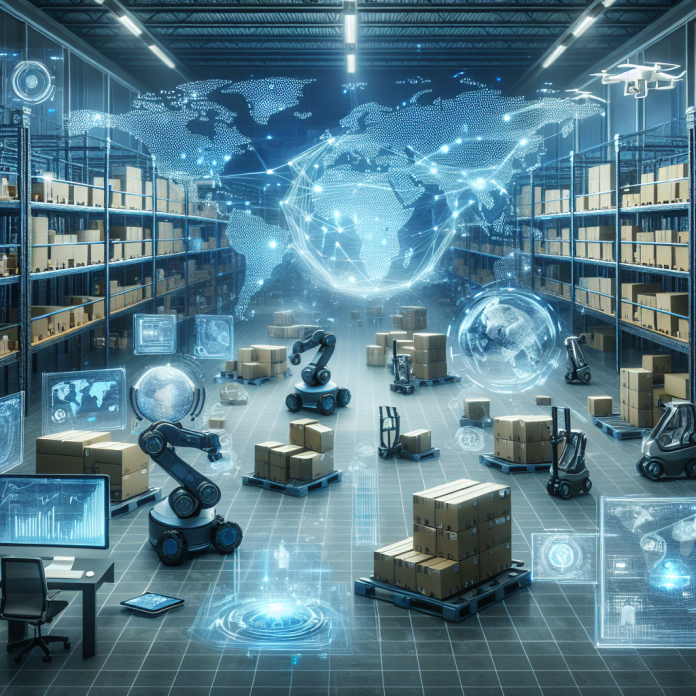# Artificial Intelligence Revolutionizing Supply Chain Optimization
The buzz around artificial intelligence (AI) in the realm of supply chain management is hard to miss. Businesses across industries are increasingly turning to AI-powered solutions to streamline their operations, improve efficiency, and reduce costs. From demand forecasting to inventory management, AI is leaving its mark on every aspect of the supply chain.
## The Rise of AI in Supply Chain Optimization
The traditional approach to supply chain management often involved manual processes, spreadsheets, and a fair amount of guesswork. However, the advent of AI has brought about a paradigm shift in the way companies tackle supply chain challenges.
AI algorithms are capable of processing vast amounts of data in real-time, extracting valuable insights, and making predictions with a level of accuracy that human analysts can only dream of. This enables businesses to make data-driven decisions that are more precise and timely, leading to improved operational efficiency and cost savings.
## AI in Action: Demand Forecasting
One area where AI is making a significant impact in the supply chain is demand forecasting. By analyzing historical sales data, market trends, and external factors like weather patterns and social media sentiment, AI algorithms can predict future demand with remarkable accuracy.
Take the example of a retail company that sells various products online. By leveraging AI-powered demand forecasting models, the company can anticipate fluctuations in demand for different products based on factors such as seasonality, promotions, and external events. This enables them to optimize their inventory levels, reduce stockouts, and minimize excess inventory, ultimately leading to improved customer satisfaction and increased profitability.
## Optimizing Inventory Management with AI
Another critical aspect of supply chain management that AI is transforming is inventory management. Traditionally, businesses would rely on manual methods or basic inventory management software to track their stock levels. However, AI-powered inventory optimization tools take it to a whole new level.
AI algorithms can analyze historical sales data, supplier lead times, and demand forecasts to determine the optimal reorder points, safety stock levels, and order quantities for each product in a company’s inventory. This not only helps businesses avoid stockouts and overstock situations but also minimizes carrying costs and improves cash flow.
## AI-Driven Supply Chain Visibility
Supply chain visibility has long been a pain point for many companies, especially those with complex, global supply chains involving multiple suppliers and partners. However, AI is changing the game by providing unparalleled visibility into every link of the supply chain.
By leveraging AI-powered analytics tools, companies can track the movement of goods in real-time, identify bottlenecks and inefficiencies, and proactively address potential disruptions before they escalate. This level of visibility not only improves operational efficiency but also enhances collaboration and trust among supply chain partners.
## AI and Sustainable Supply Chains
In addition to optimizing operational efficiency, AI is also playing a crucial role in promoting sustainability in supply chains. By optimizing transportation routes, reducing energy consumption, and minimizing waste, AI-powered solutions can help companies reduce their carbon footprint and contribute to a more sustainable future.
For example, a logistics company that leverages AI to optimize route planning can significantly reduce fuel consumption and emissions by minimizing empty miles and avoiding traffic congestion. This not only lowers operating costs but also aligns with the company’s commitment to environmental stewardship.
## Overcoming Challenges in AI Adoption
Despite the promise of AI in supply chain optimization, many companies still face challenges when it comes to implementing AI-powered solutions. From cultural resistance to data quality issues, there are several barriers that organizations need to overcome to fully realize the benefits of AI.
One common challenge is the lack of data integration across different systems and platforms within an organization. AI algorithms rely on high-quality data to generate accurate insights and predictions, so ensuring data consistency and integrity is crucial for successful AI implementation.
Another challenge is the shortage of skilled AI talent to develop and maintain AI-powered supply chain solutions. As the demand for AI expertise continues to rise, companies need to invest in training and upskilling their workforce to stay competitive in an increasingly AI-driven world.
## The Future of AI in Supply Chain Management
Looking ahead, the future of AI in supply chain management looks bright. As AI technologies continue to evolve and mature, we can expect to see even more sophisticated AI-powered solutions that push the boundaries of what is possible in supply chain optimization.
From autonomous drones and robots in warehouses to predictive maintenance algorithms for equipment, the possibilities are endless when it comes to leveraging AI to enhance supply chain operations. As companies embrace the transformative power of AI, we can look forward to a more efficient, resilient, and sustainable supply chain ecosystem.
In conclusion, AI is revolutionizing supply chain optimization, offering businesses unprecedented insights, efficiency gains, and cost savings. By harnessing the power of AI-driven technologies, companies can unlock new opportunities for growth, innovation, and competitive advantage in an increasingly complex and dynamic business environment. As we navigate the challenges and opportunities that lie ahead, one thing is clear: AI is here to stay, and its impact on the supply chain will only continue to grow.
AI may not be perfect, but it sure is a game-changer in the world of supply chain management. So, buckle up and get ready for a ride through the AI-powered supply chain of the future!

